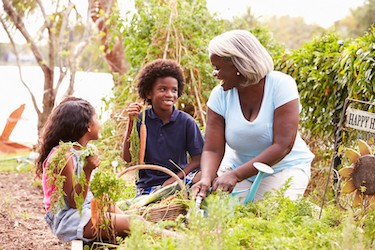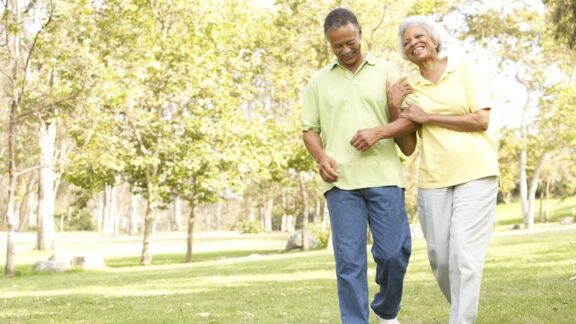People typically think of gardening as either a hobby or a necessary evil – we do it because we enjoy it or because we feel obligated to maintain an attractive yard. But did you know that there are measurable benefits of gardening for seniors, that gardening can be beneficial to mental and physical health? And that these benefits go far beyond the obvious benefits of physical exercise?
A study conducted on 60- to 95-year-olds in Australia found that home and community gardening had significant positive aging benefits on the participants’ psychosocial and physical wellbeing. Whether working in the garden or simply being there, this contact with nature led to positive benefits, said the researchers.
Specific benefits of gardening for seniors
While anyone who has worked in a garden recognizes that the activity has elements of physical exercise, the benefits extend deeper and farther.
Mobility, flexibility, and motor skills
If you have a hard time getting yourself to exercise simply for the sake of exercise, gardening can help you achieve many of the same benefits.
Even simple activities in garden work can improve mobility, flexibility, and strength: digging, lifting, moving along rows of plants, and so on. You use major muscle groups – arms, shoulders, core, legs, etc. – and you use multiple muscle groups. You engage your muscles, burn calories, and build strength. This simple exercise can help to keep your muscles and joints active and healthy.
Related: The 10 best gardening tools for seniors
Gardening can also help maintain motor skills. Activities like raking, using a wheelbarrow, weeding, and so on use fine and gross motor skills that are useful for other life activities.
Stress reduction

Gardening, like other physical activities, helps reduce cortisol levels. This hormone negatively affects stress levels, increases blood pressure, and even contributes to obesity, heart disease, and a weak immune system. Thus, reducing it can help ward off the feelings of stress and its negative impacts.
Cognitive skills
Perhaps one of the most unexpected benefits of gardening for seniors is its cognitive benefits. Gardening was among the lifestyle factors demonstrated to reduce the risk of dementia. In fact, one study found that daily gardening predicted a 36% lower risk of dementia.
This adds to the evidence of the link between physical activity levels and cognitive performance.
Bone health + heart health
Many seniors struggle with or are at risk of developing osteoporosis, a weakening of the bones. Outdoor gardening exposes the body to sunlight, a natural source of vitamin D, which helps the body produce calcium, which in turn strengthens and maintains bones. Gardening as a workout also supports bone health.
Vitamin D contributes to a healthy heart, too, say the experts at Columbia Wellness Center at Columbia University. Low levels of vitamin D are a risk factor of stroke, heart failure, peripheral artery disease, and so on, influencing genes, the cells of the heart, and the risk factors of high blood pressure.
Social interactions

While the study of older adults in Australia reported that members of gardening groups reported significantly more social and physical benefits than non-members, these social benefits can apply in a variety of ways. Sure, you can probably find a gardening club or community garden in your area, and reap social enjoyment as well as blooms and produce. But you can also introduce grandchildren or neighborhood kids to the joys of gardening, or simply share beautiful flowers and healthy produce with friends and family. This expands the benefits of gardening for seniors to so many other people in your community!
Increased serotonin and improved relaxation
As an outdoor activity, gardening provides easy nature therapy – “the tonic of wildness,” as Henry David Thoreau called it. Researchers in Japan have long been interested in “forest therapy,” or “forest bathing,” and Western researchers have more recently begun their own studies. A 2016 review of the scientific evidence supporting the physiological effects of relaxation caused by natural stimuli supported the belief that nature therapy can play an important role in preventive medicine.
More specifically, studies have shown that contact with soil actually triggers the release of serotonin, a chemical in the brain known to boost the mood and bring a feeling of calm and relaxation. In fact, a specific soil bacterium, Mycobacterium vaccae, triggers the release of serotonin. Similarly, harvesting fruit or vegetables (possibly even blossoms) can trigger the release of dopamine, which triggers positive emotions.
So go ahead. Roll up your sleeves, sink your hands in the soil, and reap your own benefits of gardening for seniors. You’ll be healthier and happier for it!




